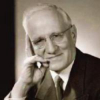E. Stanley Jones

E. Stanley Jones
Eli Stanley Joneswas a 20th-century Methodist Christian missionary and theologian. He is remembered chiefly for his interreligious lectures to the educated classes in India, thousands of which were held across the Indian subcontinent during the first decades of the 20th century. According to his and other contemporary reports, his friendship for the cause of Indian self-determination allowed him to become a friend of leaders of the up-and-coming Indian National Congress party. He spent much time with Mohandas K. Gandhi, and...
NationalityAmerican
ProfessionTheologian
CountryUnited States of America
Continuing a Lenten series on prayer: Prayer is co-operation with God. It is the purest exercise of the faculties God has given us - an exercise that links these faculties with the Maker to work out the intentions He had in mind in their creation.
In the prayer time, the battle of the spiritual life is lost or won.
If you don't surrender to Christ, you surrender to chaos.
Prayer is commitment. We don't merely co-operate with God with certain things held back within. We, the total person, co-operate. This means that co-operation equals committment.
We find, sooner or later, that in prayer we either abandon ourselves or we abandon prayer.
Prayer is aligning ourselves with the purposes of God.
Prayer is commission. Out of the quietness with God, power is generated that turns the spiritual machinery of the world. When you pray, you begin to feel the sense of being sent, that the divine compulsion is upon you.
Prayer means that the total you is praying. Your whole being reaches out to God, and God reaches down to you.
When prayer fades out, power fades out. We are as spiritual as we are prayerful; no more, no less.
Prayer is surrender--surr ender to the will of God and cooperation with that will. If I throw out a boathook from the boat and catch hold of the shore and pull, do I pull the shore to me, or do I pull myself to the shore? Prayer is not pulling God to my will, but the aligning of my will to the will of God.
Here he tells us that the new birth is first of all 'not of blood'. You don't get it through the blood stream, through heredity. Your parents can give you much, but they cannot give you this.
When we think of the ideal, we do not add virtue to virtue, but think of Jesus Christ, so that the standard of human life is no longer a code, but a character.
To implant fear in the minds of children is a crime. If parents try to rule the child by fear, then fear rules the child.
If you don't surrender to God, don't think you don't surrender. Everybody surrenders -- to something.